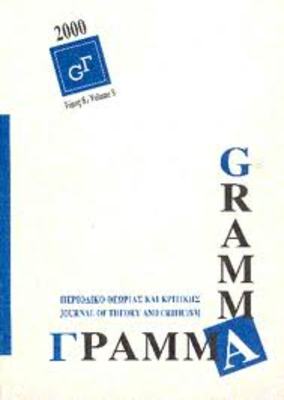Drowning in white ink : the feminine in the poetry of Katerina Anghelaki-Rooke and Eleni Vakalo
Part of : Γράμμα : περιοδικό θεωρίας και κριτικής ; Vol.8, No.1, 2000, pages 99-123
Issue:
Pages:
99-123
Abstract:
The influence exerted on contemporary women poets (as women and as artists, by the patriarchal traditions of the canon is examined here through the comparative analysis of selected works by Anghelaki-Rooke and Vakaio. The particularities of the Greek cultural context are, of course, accounted for; however, the investigation focuses mainly on tracing and analysing within the poems elements which contemporary feminist theory would identify as constituents of écriture fémmine. The term, a product of the “French” feminism of Hélène Cixous, Luce Irigaray and Julia Kristeva, denotes textual markers such as body-centered thematics; an experimental attitude towards language, form and meaning; use of circular time; references to the bonds of motherhood; a fluidity of identity; and an exploration of feminine sensibility - all of which not only appear in, but essentially characterize the work of the two Greek women poets. If, however, the exercise of écriture féminine is an act of pure feminist empowerment for the French theoreticians and authors, the undercurrents of the traditionally patriarchal Greek society, as felt in the poetry of Anghelaki- Rooke and Vakaio, do not allow for a similar, wholy positive outcome. To the extent, then, that the personal poetic experience can be said to reflect the tendencies and the questions of an entire society, the conclusion drawn from these two paradigms is that the use of “white ink” — the milk of motherhood, which Cixous sees as a fundamental means of expression in feminine writing —is, for the Greek 20th century literary canon, as ambiguous and obstacle ridden as it is inevitable and vital.
Subject:
Subject (LC):
Keywords:
ποίηση, Ελληνίδες ποιήτριες
Notes:
Περιέχει βιβλιογραφία




